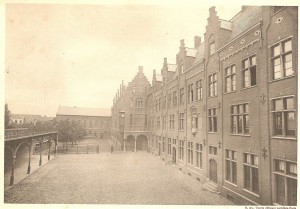Monday Next, November 2nd 1914
300 Fat sheep and lambs
20 Fat beast, calves and pigs
Sale at 2.30
John Margetts and Sons, Auctioneers, Warwick
Banbury Guardian, October 1914
Monday Next, November 2nd 1914
300 Fat sheep and lambs
20 Fat beast, calves and pigs
Sale at 2.30
John Margetts and Sons, Auctioneers, Warwick
Banbury Guardian, October 1914
One shilling will give a man 150 cigarettes
It is obvious from the letters from our soldiers at the front, which have appeared in the public press, that the most prized of all gifts from home are cigarettes. Unobtainable out there, these comforts, in which the soldier seeks to find relaxation after the strain of the fight, and even during it, have become almost priceless treasures. It seems a great pity that our men, who are fighting so bravely should be denied what can be sent to them in abundance at little cost. The only, we are sure, which is required to ensure such a supply is to bring home to the public how easily they can assist in keeping Tommy Atkins supplied. It has been suggested that each county might very well keep the men of its own regiment supplied with tobacco and cigarettes, and the assistance of the press has been asked in making known how this can be done. We may point out that special arrangements have been made whereby cigarettes and tobacco sent to the Army in the fighting line can be supplied free of duty and free of postage, and hence the public can get them for this purpose at a greatly reduced cost, and consequently be able to send more for their money. They must, however, be sent through a recognised tobacco dealer, and must be for the fighting force, and not for any regiment at home.
We therefore appeal to Banbury to help keep the men of the Oxfordshire and Buckinghamshire Light Infantry supplied with cigarettes. They can do so as follows:
Miss. A. M. Phillips of 19, High Street, Banbury, has made an arrangement with Messrs. Wills for cigarettes and tobacco ordered through her to be dispatched direct to the troops named by the subscribers.
She asks for subscriptions of any amount to enable her to order consignments to be sent to the Oxfordshire regiment.
A subscription of 1s. will send a packet of 150 cigarettes to the regiment; of 3s. 6d. a packet of 500, and so on, a subscription of £1 sending 3,000 cigarettes to the regiment.
In the case of tobacco, packets of two pounds will go duty free, and subscriptions can be accepted for tobacco instead of cigarettes.
Although primarily intended for the Oxfordshire regiment, subscribers interested in other regiments at the front can request that their money be spent on cigarettes or tobacco for the regiment they may name.
Friends wishing to send presents of cigarettes or tobacco to relatives or acquaintances in the fighting line can request that their subscriptions be spent on a packet to be addressed individually to the soldier named, but must supply the regimental number, rank, and name of the soldier, and the regiment to which he belongs.
Although Miss. Phillips only commenced this arrangement this week, she was able yesterday to send 6,000 cigarettes to the front for the Oxfordshire and Bucks Light Infantry.
German withdrawal from Warsaw.
There are seven Belgian refugees at the Catholic school in Avon Dassett.
Francois (born September, 1901) and Maria (born 1909) Van Oten Eynote (father, Louis) from College St Rombauts and Armand de Ceularde (born September, 1905, father, Charle) from St Denis enrolled in Avon Dassett school today.


Avon Dassett School Log Book
Battle of Yser, Flanders.
Mr. W. J. Weld presided at the meeting on Thursday, when there were present – Messrs. Ridley Brown, W. H. Jarvis, A. Rudge, A. Fairfax (clerk), G. Elkington (surveyor) and J. Smith (inspector).
Miscellaneous
The Clerk reported that the balance in hand was £219 7s 9d. He said he had received a communication asking if there were any suitable places in the district for hospital accommodation were it needed, and he had replied that the only places were schools and reading rooms, which might be available.
The Clerk read a letter from Mr. Gordon Everett, the secretary of the Warwickshire Relief Committee, asking if any of the Council’s men had joined the colours. The reply was in the negative, consequently there was no necessity for any relief measures.
The Radway Drainage Question
This matter again came up for discussion, having been postponed for two months.
Mr. Brown said that Captain Gwyer and Mr. Gwyer were both engaged with the forces, and he suggested that the matter should be further postponed.
The Chairman observed that Mr. Lloyd George had said in a speech that local authorities should take care not to spend too much money.
Mr. Brown moved and Mr. Jarvis seconded that the matter be postponed for two months, which was agreed to.
Widening the road at Ratley
The Clerk read a letter from Mr. G. England, of Ratley, in which he offered to widen the road to twelve feet and put up a ‘dry’ wall four feet high for £6 15s.
The surveyor said the amount was reasonable, and said there was a good deal of preparatory work to be done. There was an old ruin to be taken away.
On the motion of Mr. Brown seconded by Mr. Rudge, Mr. England’s offer was accepted.
The Diversion of a Watercourse at Warmington
The Clerk read a letter from Mr. E. H. Boote, of Warmington, the clerk to the Parish Council, stating that a complaint had been made by a number of householders with regard to the diversion of an old watercourse by Lady Stonhouse, and asking the Council to inform her that the watercourse must be put back to its former position. The letter said that the Parish Council had distinctly informed Lady Stonhouse that it was not in the power of the Council to grant her leave to divert the watercourse. The clerk said that when Mr. Elkington opened the watercourse he found that it went a different way to what Lady Stonhouse supposed.
The Chairman. I told Lady Stonhouse that what she did in the matter was entirely at her own risk. It will be alright if the pipe is plugged.
The surveyor said that they could not tell where the water really did go without taking a great deal more trouble in opening the place up. If the pipe was plugged the water, he thought, would go into its proper course.
Mr. Jarvis said the Parish Council wished the thing settled. They objected to what had been done, and he moved the Clerk write to Lady Stonhouse and inform her that the water must be allowed to go into its proper course.
Mr Rudge seconded the motion, which was carried.
Overcrowding at Avon Dassett
The Chairman drew the inspector’s attention to a case of overcrowding at Avon Dassett. It was said there was something over twelve in the house but he would not vouch for the truth of it. A new tenant had taken possession of the cottage. He also called the inspector’s attention to a drain at the cottages above the chapel, which was blocked. The inspector said he would attend to the matters.
Banbury Guardian, October 1914
The masters of the Warwickshire, Lord Willoughby de Broke and Mr J. A. Fielden hope to hunt four days a week instead of five.
Banbury Guardian, October 1914
Monday Next, October 19th 1914
350 Fat sheep and lambs
20 Fat beast, calves and pigs
Sale at 2.30
John Margetts and Sons, Auctioneers, Warwick